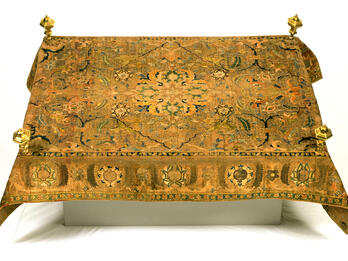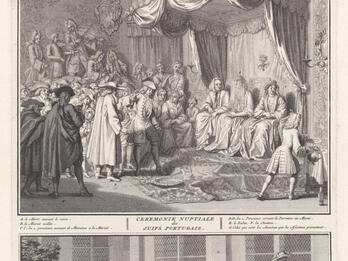Bayit ne’eman (Faithful House)
A Sixth Discourse on the Virtue of Those Who Uphold the Torah
In Midrash ḥazit [Midrash Rabbah Song of Songs] it is stated:
And besides that Koheleth was wise, he also taught the people knowledge; yea, he pondered, and sought out, and set in order many proverbs (Ecclesiastes 12:9). He pondered the words of the Torah and investigated the words of the Torah. He made handles for the Torah. You will find that until Solomon came, there was no parable. R. Naḥman gave two illustrations. R. Naḥman said, Imagine a large palace with many doors, so that whoever entered could not find his way back to the door, until one clever person came and took a coil of string and hung it up on the way to the door, so that all went in and out by means of the coil. So, until Solomon arose, no one was able to properly understand the words of the Torah, but as soon as Solomon arose, all began to comprehend the Torah. R. Naḥman gave another illustration: a thicket of reeds which no one could penetrate, until one clever man came and took a scythe and cut some down, and then all began to enter through the cutting. So did Solomon [with the obscurities of the Torah]. R. Jose said, Imagine a big basket full of produce without any handle, so that it could not be lifted, until one clever man came and made handles for it, and then it began to be carried by the handles. So until Solomon arose, no one could properly understand the words of the Torah, but when Solomon arose, all began to comprehend the Torah. R. Shila said, Imagine a big jug full of hot water, with no handle by which it could be carried, until someone came and made it a handle; then it began to be carried by its handle. R. Hanina said, Imagine a deep well full of water, cold, sweet, and nourishing water, but no one was able to get a drink from it, until one man came, and joining rope to rope and cord to cord, drew from it and drank, and then all began to draw and drink. So, proceeding from one thing to another, from one parable to another, Solomon penetrated the innermost meaning of the Torah, as it is written: The proverbs of Solomon, son of David, king of Israel; to know wisdom and instruction (Proverbs 1:1–2). Through the proverbs of Solomon, he mastered the words of the Torah [Song of Songs Rabbah 1:8].
A major principle for us is that the power of an action connected to some type of commandment is greater than the person who acts, for the one who acts is a mere tool that carries out the action. This is like an artist who produces a tool for his actions by using other tools; he acts according to his knowledge, and the action is named according to the action itself, and not according to the tool which naturally acts. Shall the pick-axe be prided over the stone cutter? Shall the saw be greater than its user? As the wise man [Nissim of Girona, Derashot ha-Ran, Sermon 6] said:
There is no doubt that the active causes exist in man. All things that increase in closeness to man have their powers weakened in regard to the salvation of man; it is the opposite in regard to those things which become distant from him. There is an allegory in which a man is sentenced to be hit before a judge. The more immediate cause of the punishment, which is closer to the man, is the stick, even though it has no power whatsoever to lessen its damage. One level more remote from the man being hit [than the stick] is the man who hits him, who is an envoy of the judge. He is stronger than the stick, which is the cause that is closer to the man being punished, but his power to save the man being hit is weak, for he does not have the authority to ease the punishment very much; he cannot eradicate the strikes, for this is only within the authority of the judge. Even the judge, who is an even further cause than either the stick or the one who hits the man being punished, does not have complete power, for this falls under the authority of the king. Only a naïve person being punished would implore the person who is hitting him, or even the judge, to stop. On the other hand, a wise man would implore of the furthest cause, which is the king. We, too, at this time in history, rely upon those who hit us, and all of our artifices are for the sake of immediate causes, whose power to save us is little. For this reason, Scripture blamed Israel when they would send emissaries to the kings of Egypt. So too did Scripture blame Asa saying [2 Chronicles 16:12]: “In his disease he sought not to the Lord, but to the physicians.” So it is with one who fears bad air and puts all of his efforts into fixing it, or one who fears bad food and endeavors to fix it; such people attempt to fix the immediate causes, whose powers are weak.
It is thus the case that the wise, thoughtful man does not turn to the immediate causes, which are in actuality remote, but to the remote causes which in actuality are immediate.
Credits
Published in: The Posen Library of Jewish Culture and Civilization, vol. 5.




